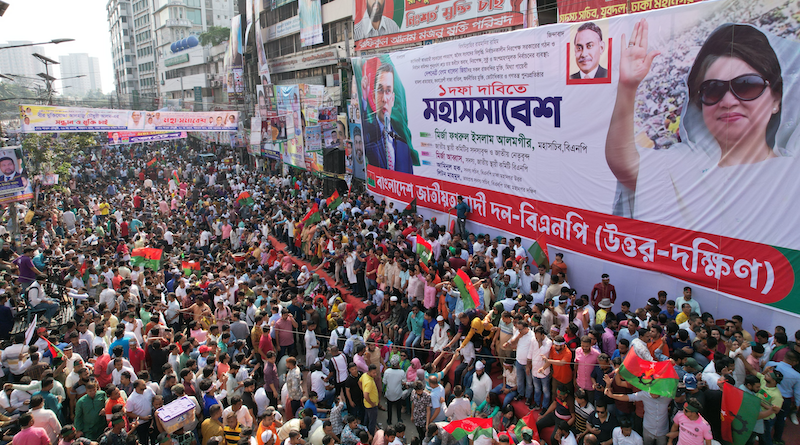Bangladesh’s Crucial Juncture: Elections, Uncertainty And Ramifications – Analysis
By Institute of South Asian Studies
By Imran Ahmed
As Bangladesh draws closer to its scheduled elections in January 2024, there are mounting concerns over the prospect of a free and fair electoral process. Historically, neutral caretaker governments were mandated to oversee general elections intended for every five years.
Prime Minister Sheikh Hasina, who leads the Awami League party and has held power since 2009, abolished this requirement in 2011 through the 15th Amendment which omitted ‘Chapter IIA Non-Party Care-Taker Government’ of the Constitution. The Bangladesh Nationalist Party (BNP), led by Khaleda Zia, who previously served as prime minister from 1991 to 1996 and then again from 2001 to 2006, forms the main opposition and contests the government’s ability to conduct impartial elections, fearing the manipulation of ballot box outcomes. The BNP boycotted the 2014 elections over similar concerns. The government also faced serious accusations of rigging the 2018 elections.
As a result, the opposition has organised strikes and blockades, all aimed at securing the prime minister’s resignation and the establishment of a neutral caretaker administration to oversee the elections. The government’s response to the unrest has been state repression, including the arrest of hundreds of BNP members, supporters and leadership, leading Stéphane Dujarric, spokesperson for the United Nations Secretary-General, to voice his concerns on the significant number of individuals detained. Hasina has, so far, declined to engage with the opposition or exhibit any inclination toward reaching a political middle ground. This hardline approach towards her opponents has notable risks. A potential boycott by the BNP could altogether undermine the elections’ legitimacy.
Moreover, the government’s approval of international election observers underscores the need for transparency and accountability in the electoral process to appease both international as well as domestic criticisms. However, no official applications from foreign observer organisations have been received, making the situation all the more puzzling. In August 2023, the Election Commission posted a list of 68 approved observers but investigations uncovered that nearly half lacked election monitoring experience or had ties to the ruling Awami League, breaching the country’s election laws. As the 21 November 2023 deadline for applications looms, it remains to be seen whether any clarifications or applications will emerge, adding to the intrigue surrounding this critical aspect of the upcoming elections.
The mutual accusations of violent provocation between the government and the opposition persist, further prolonging the political deadlock. There are other uncertainties at play. While Hasina has effectively harnessed the backing of regional powers like India, China, Iran and Russia to counter global calls for democratic reforms, growing United States (US) pressure on the government has raised concerns (and conspiracies) that the US’ interest in Bangladesh’s democratic and electoral process is a cover for its desire for regime change. For the BNP, these developments offer opportunities but Zia’s failing health of Zia presents concerns and questions about the party’s long-term future. Zia’s pleas for medical care abroad, including a liver transplant, have been met with denial.
As the situation unfolds, it remains to be seen how these complex issues will evolve and potentially shape Bangladesh’s future. For ordinary citizens, the unrest has significantly disrupted their daily lives. As journalist Syful Islam explains, “The protests impede the movement of vehicles and are prompting many citizens to limit their outings to avoid potential violence. Scores of arson cases and several deaths have been reported, while hundreds of BNP members and leaders have been rounded up.”
There are concerns regarding the economic repercussions of the ongoing political deadlock. In the last decade, Bangladesh has experienced substantial economic progress and made notable efforts to reduce poverty and improve social indicators. The country has also been able to attract foreign investment and enter trade agreements. Its sizeable and often well-educated youth population offers a formidable economic advantage in the labour market.
However, economic stagnation, reduced investment, declining business confidence and decreased foreign investments hinder economic growth during political deadlock and uncertainty. The risk of currency depreciation impacting trade balances and inflation, delays in essential infrastructure projects, fiscal mismanagement and slower job creation, leading to more unemployment, can produce a downward spiral of more and more unrest and more opposition towards the government.
While the government and the opposition appear to be on a ‘collision course’, a resolution that balances political stability and democratic principles remains in the country’s best interest. However, “the more the opposition escalates”, Michael Kugelman predicts, “the more defiant the government will likely become. Neither side will want to give an inch”. As Bangladesh stands at a crossroads, the uncertainty surrounding the upcoming elections and the fate of its political leaders continues to weigh heavily on the minds of its citizens, who hope for a democratic and equitable future.
About the author: Dr Imran Ahmed is a Research Fellow at the Institute of South Asian Studies (ISAS), an autonomous research institute in the National University of Singapore (NUS). He can be contacted at [email protected]. The author bears full responsibility for the facts cited and opinions expressed in this paper.
Source: This article was published by the Institute of South Asian Studies (ISAS)

